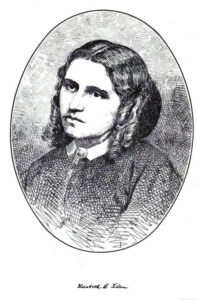
She Said – He Said – She Said
Unable to ignore the public scandal surrounding allegations of an affair between himself and Mrs. Elizabeth Tilton, Reverend Henry Ward Beecher requested Plymouth Church to appoint a committee to investigate the charges. With reporters in attendance, committee members began gathering evidence on June 27, 1874. On July 23, Elizabeth Tilton wrote letters to several local newspapers to declare that she and Rev. Beecher never committed adultery. A week later, Mrs. Tilton testified to the committee and affirmed she had not committed adultery and that her husband’s testimony was “heartless.” She also said her husband was dissatisfied with her as a wife and that he had a jealous nature.
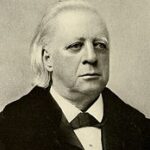
Beecher testified that in his capacity as her pastor, he had visited an unhappy woman whose husband left her alone for months, and he counseled her while her husband questioned the divinity of Christ and befriended radical women like Victoria Woodhull. Beecher went so far as to charge Tilton was the one who had an affair. This allegation was not investigated further.
On August 2, the committee issued its report. Members found that in 1863, Theodore Tilton invited Beecher to visit his home. Over time, Beecher also became a friend of Mrs. Tilton, a situation that met with Tilton’s approval. The committee concluded that when Tilton began to support the concept of free love, the change deeply upset his wife who was very religious. In her grief, she naturally appealed to her pastor for advice and support. It appeared that she became strongly attached to Beecher, and in July 1870 confessed to her husband that she held Beecher in affection. Under the circumstances, the committee held Beecher innocent of any inappropriate behavior.
Criminal Conversations & Alienated Affections
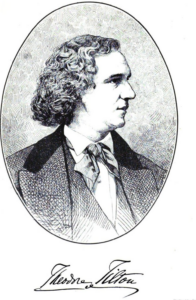
Theodore Tilton did not accept the verdict and on January 11, 1875 he filed a civil suit in Brooklyn City Court charging Henry Ward Beecher with “criminal conversation” and “alienation of affection,” and demanded damages of $100,000. The trial lasted six months – it took two months for just the opening and closing statements, including 16 full days for final arguments. Tilton had five lawyers and twelve witnesses. Beecher hired 67 lawyers who called 95 witnesses. It was a sensational trial. People lined up the night before to gain a ticket into the courtroom, and sometimes 3,000 people were turned away at the courthouse door. Tickets sold for $5.00 apiece on the black market. Jurors and spectators gasped and fainted in the summer heat, sometimes being carried out of the courtroom.
Supporters expressed their commitment with flowers as each side’s supporters competed to send ever more showy floral displays. No doubt, the heady scents contributed to conditions that led to fainting.
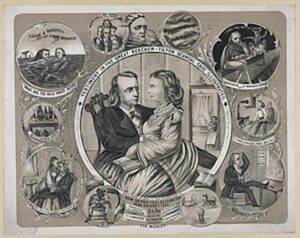
Alleged adultery was scandalous enough, but the trial was about more than that. Theodore Tilton alleged the most respectable person in New York City lured his wife into an affair. Tilton’s lawyers urged the jury not to be taken in by Beecher’s reputation. “You must dig beneath the surface of appearances,” they argued. “You must induce the truth from the clues presented, and follow them wherever they may lead.” The truth, Tilton’s lawyers insisted, must be followed even into the most intimate areas of the home.
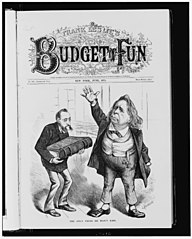
Beecher’s defense argued that the jury must decide to acquit their client in order to preserve social civility. In his closing argument, one defense lawyer argued that Tilton’s suit attacked everything that held sociey together. “It is that the favored, approved, tried, best results of this social scheme of ours, which includes marriage, and of this religious fatih of ours, which adopts Christianity, is false to the core.” Even if these activities may be going on in families and no one knows anyhing about it, “shall we then discard all this, shall we believe . . . That there is not necessary connection between character and conduct?”
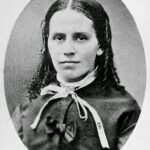
Elizabeth Tilton, as the plaintiff’s spouse, was not allowed to testify, though she appeared in court every day. One reporter described Elizabeth as “a small, fragile woman, dark complexion, low in stature, girlish in look, her hair parted in the center and falling in ringlets behind — looking . . . Like a schoolgirl of eighteen.”
Acquittal
The jury deliberated for eight days, casting 52 ballots. Nine jurors thought Beecher was innocent; three thought he was guilty. Thus was Henry Ward Beecher acquitted of the charges.
The Aftermath
To solidify his position, Beecher requested Plymouth Church to conduct a second investigation into events. Once again, he was exonorated. In fact, due to his legal expensives, Plymouth Church voted to give Beecher a raise of $100,000.
In 1878, Elizabeth Tilton, now separated from her husband, publicly admitted to having an affair with Henry Ward Beecher. Plymouth Church immediately dismissed her from their congregation. Theodore Tilton, unable to find work, moved to Paris.
Questions Remain
Was Beecher maliciously accused, or was he a hypocrite?
Was Tilton an innocent husband devasted by his wife’s betrayal, or simply out to destroy Beecher?
And what of Elizabeth Tilton?
Was she a pious, pure wife or a weak woman who capitulated to Beecher and then lied about it? Who was she anyway? Some researchers suggest that, to a certain extent, she may have been an abused wife – a woman whose husband intimidated her and subjected her to verbal abuse.
In the public letter Elizabeth wrote to the New York Times in April 1878, she admitted her part in the scandal:
“I now solemnly affirm that the charge brought by my husband of adultery between myself and the Rev. Henry Ward Beecher, was true and that the life I had lived so well the last four years has become intolerable to me.”*
🌠 🌠 🌠
*Elizabeth’s letter quoted in Carol Kolmerten. “Learning and Research with Students: The Example of the Tilton/Beecher Scandal.” Journal of the National Collegiate Honors Council. Spring 2000.
Illustrations
Elizabeth Tilton, 1875.
Henry Ward Beecher
Theodore Tilton, 1875.
Testimony in Beecher-Tilton Scandal Case by James E. Cook. 1875.
“The Only Thing He Won’t Kiss” 1875.
Elizabeth Tilton
Laura Hanft Korobkin. “The Maintenance of Mutual Confidence: Sentimental Strategies at the Adultery Trial of Henry Ward Beecher. Yale Journal of Law & the Humanities, Vol 7, Issue 1, 1995.
Robert Shaplen. “The Beecher-Tilton Affair. New Yorker. June 4, 1954.

Sandra Wagner-Wright holds the doctoral degree in history and taught women’s and global history at the University of Hawai`i. Sandra travels for her research, most recently to Salem, Massachusetts, the setting of her new Salem Stories series. She also enjoys traveling for new experiences. Recent trips include Antarctica and a river cruise on the Rhine from Amsterdam to Basel.
Sandra particularly likes writing about strong women who make a difference. She lives in Hilo, Hawai`i with her family and writes a blog relating to history, travel, and the idiosyncrasies of life.

